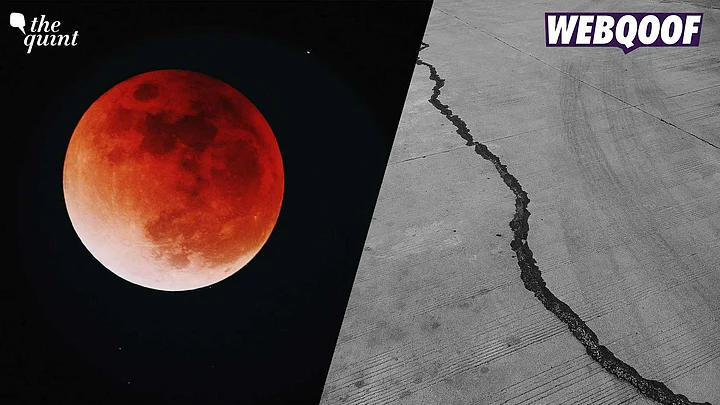On Tuesday, 8 November, India witnessed a total lunar eclipse, which was the last total lunar eclipse visible from India till 2025.
Incidentally, at around 2:00 am on 9 November, areas around Delhi and the National Capital Region (NCR) felt tremors of an earthquake. The quake's epicentre was Nepal, which had a 6.3 magnitude.
The two events have led to several theories being floated on the internet about a possible correlation between the two. But is there one?
(Archives of similar claims can be found here, and here.)
The Quint spoke to Aniket Sule, an Associate Professor at Homi Bhabha Centre for Science Education, and looked through research but didn't find any evidence to link the two.
What did we find? :
One cannot predict the occurrence of a quake using eclipse as a reference point.
We could not find any data showing atmospheric changes during a lunar eclipse, and Professor Sule said no atmospheric changes can be experienced on an eclipse day.
There is no difference in tidal effects during a lunar eclipse day as compared to the effects observed on other full or new moons.
Can a Lunar Eclipse Lead to an Earthquake or Other Natural Disasters?
What is a lunar eclipse?: During a lunar eclipse, the moon falls into the shadow of the earth. There are two types of lunar eclipses: partial and total.
The moon partially passes through the earth's shadow in the partial one.
The moon passes through the darkest part of the earth's shadow in a total lunar eclipse.
What causes an earthquake?: The earth's outer layer composes tectonic plates which are always slowly moving. Due to this, they get stuck at their edges due to friction. When the force finally overcomes the friction, the pent-up pressure is released in the form of waves, causing an earthquake.
What do studies say?: A research article published in 2018 by Susan E Hough in Seismological Research Letters, a bi-monthly peer-reviewed forum, mentioned that there is no evidence that large earthquakes are modulated by the lunar cycle.
What did Professor Sule say?: He denied any such possibility and said, "There is nothing extraordinary happening. If one looks at the data from previous year and perform a statistical analysis, they will realise that hardly any lunar eclipse coincide with an earthquake."
He further mentioned that it is not possible to predict earthquakes using lunar eclipses as a reference.
What does NASA say?: Mitzi Adams, a solar astronomer from NASA's Marshall Space Flight Center, said during an 'ask an expert session' in 2010 that there was no correlation between solar or lunar eclipses and earthquakes. The transcript of the entire chat is available here.
Does a Lunar Eclipse Make Some Atmospheric Changes?
Professor Sule told The Quint that no atmospheric changes happen during a lunar eclipse.
He said that the moon’s position is not changing in the sky. It is just passing through the earth’s shadow.
Further he mentioned that if at all, there is any change, it is the amount of light coming from the moon changes. It is so small that it hardly causes any change in the earth’s atmosphere.
So, what exactly happens during an eclipse?: During a lunar eclipse, the moon does not directly get sunlight directly as earth blocks it. However, some light still gets refracted through the Earth's atmosphere. The colour of the moon during an eclipse depends on the conditions of the atmosphere (like dust, humidity, smoke, etc).
We could not find any research or articles that showed atmospheric changes during a lunar eclipse.
Does the Lunar Eclipse Contribute To an Increase in Seismic Activities?
What do studies say?: The United States Geological Survey (USGS) has mentioned on its website that a recent study found that earthquakes are more likely to occur near the edges of a continent or in subduction zones during times of a high earth/ocean tide.
What is an earth/ocean tide?: Movements or small deformations on earth's or the ocean's surface, which are caused by the gravitational forces of sun or the moon with respect to the earth.
What is a subduction zone?: When the tectonic plates collide and one plate sinks under the other, then a subduction zone is created.
Is there a change during an eclipse?: The website further mentioned that while lunar eclipses are special cases of new moon and full moon, no difference is observed in the tidal effects.
What did Professor Sule say?: He told The Quint that there is no change in seismic activities during an eclipse day. He further said, "The moon is not changing its position in the orbit. It is just at the same distance from earth like any other day. So, there is no great changing happening in the moon’s gravity on the eclipse day and there is no change in seismic activities."
Clearly, some of these claims around the correlation between earthquakes and lunar eclipses are factually incorrect.
(Not convinced of a post or information you came across online and want it verified? Send us the details on WhatsApp at 9643651818, or e-mail it to us at webqoof@thequint.com and we'll fact-check it for you. You can also read all our fact-checked stories here.)
